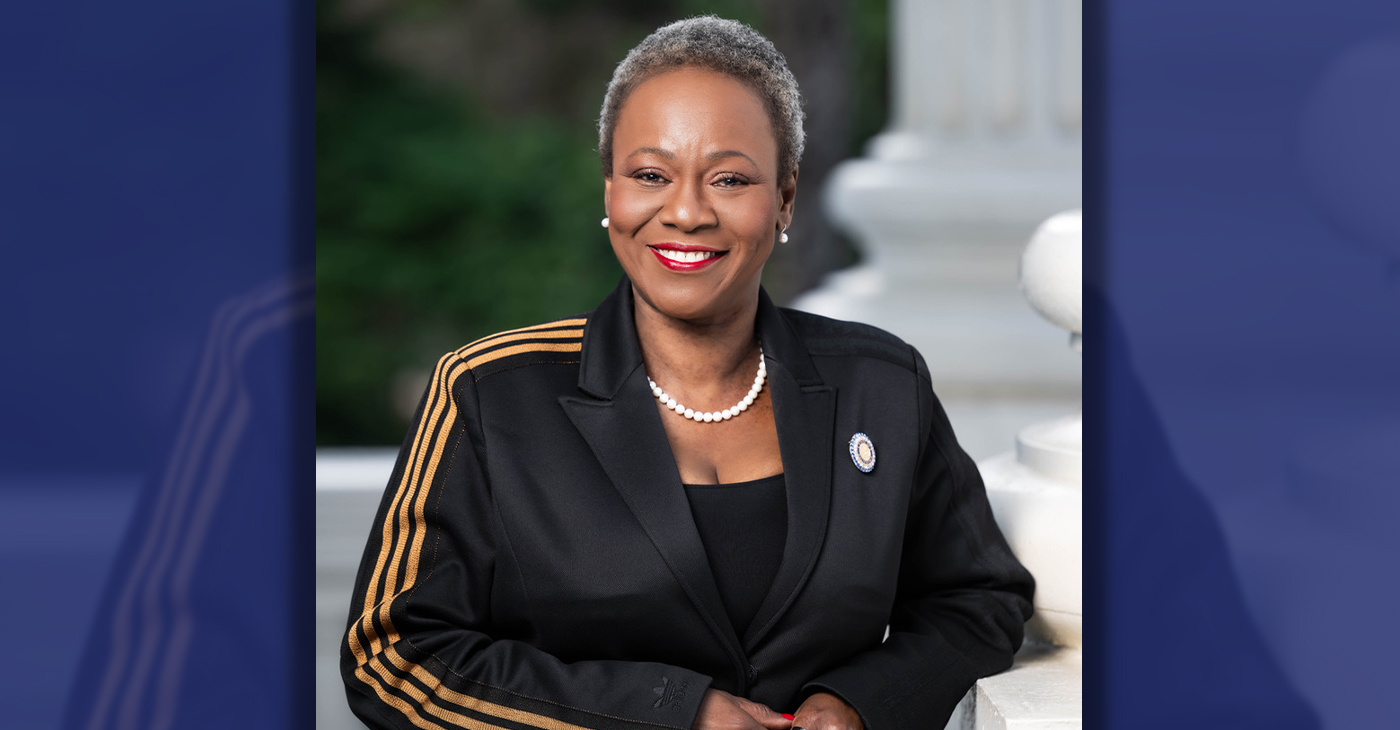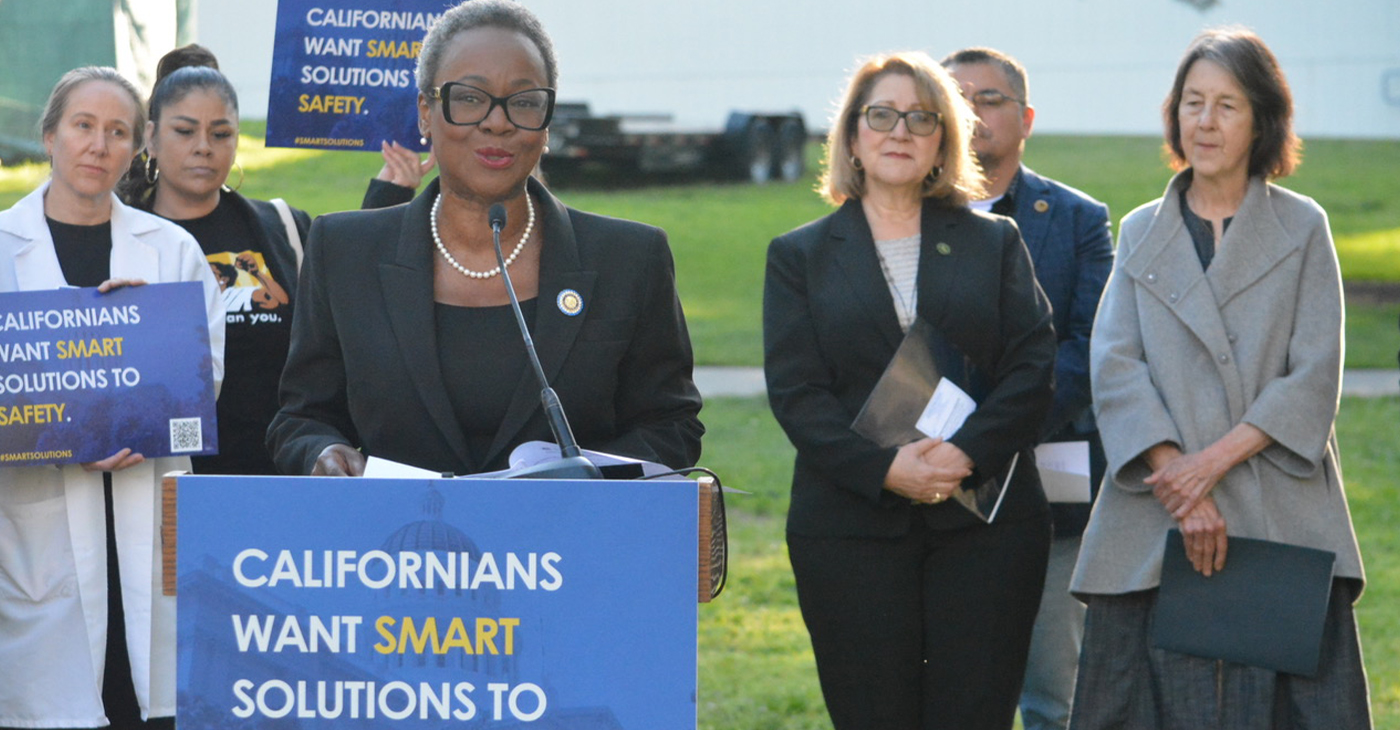Government
PRESS ROOM: Alex Padilla Takes Oath of Office for Second Term as California Secretary of State
LOS ANGELES SENTINEL — Alex Padilla took the oath of office for his second term as California Secretary of State at the Secretary of State Office in Sacramento.
By Sentinel News Services
Alex Padilla took the oath of office for his second term as California Secretary of State at the Secretary of State Office in Sacramento. Chief Justice of the California Supreme Court Tani Cantil-Sakauye administered the oath.
Padilla was re-elected in November with 64.5 percent of the vote. He received 7,909,521 votes—the most votes any Latino has received in a statewide election in US History.
The following are Secretary Padilla’s remarks, as prepared, following his oath of office:
“My fellow Californians, thank you for your support and for the honor of being able to serve as your Secretary of State for another term.
Four years ago, when I was first sworn in as Secretary of State, I stood on this very stage and pledged to work tirelessly to bring more Californians into the democratic process.
I made that promise based on our shared belief that we are a stronger democracy — and a better California — when voices from every corner of the state are heard and counted.
That promise is rooted in the most basic right afforded to all American citizens: our right to vote.
Our work in California to ensure that our elections are free, fair, and accessible to all comes at a pivotal moment in our nation’s history.
We face a President determined to roll back the clock on voting rights, ignore direct attacks to our elections, undermine the census, and demonize immigrants.
In these unprecedented times, our determination, to never waiver in our belief that our right to vote is fundamental, has never been more critical.
So I’m doubling down on our fight in Sacramento — and in Washington, DC — to defend our democracy.
And working on the front lines with so many of you, I know that our collective resolve has never been stronger.
And this is why in the face of cynical efforts to suppress the vote in dozens of states across the country, and documented efforts by foreign adversaries to undermine the integrity of our elections and public confidence in our elections, I am proud to report that Californians have responded with record high voter registration and record voter turnout. Both enabled by our work to increase election security and accessibility.
Voter registration is at an all-time high — 19.7 million Californians were registered to vote going into the 2018 general election.
And turnout is up — more than 12.5 million Californians cast a ballot last November.
That’s nearly a 65 percent turnout — the highest in a Gubernatorial election since 1982.
Our work during my first term has made a real and direct impact on Californians showing up at the polls.
We launched Same-Day Registration, officially known as Conditional Voter Registration. More than 55,000 eligible Californians exercised this option to cast their ballot.
We introduced online Pre-Registration for 16- and 17-year-olds and nearly 300,000 young people have done so.
We launched automatic voter registration, known as California Motor Voter, integrating voter registration into the DMV transactions of eligible Californians.
More than 775,000 previously eligible, but unregistered voters have been registered to vote!
California Motor Voter has not been without its challenges, so I want to be clear about this: I will work with the new Administration and new leadership at DMV to make sure the necessary oversight and accountability measures are in place to ensure the integrity of the program and voter registration data.
But we will do so in a way that honors our responsibility to facilitate voter registration and civic participation.
And as much as we’ve worked to a register a record number of voters, we’ve been equally committed to make voting more accessible.
The 2018 election was also the debut of the Voter’s Choice Act, a new way of administering elections that offers voters more choices for when, where, and how to cast their ballot. Five counties chose to modernize their elections in 2018 — Madera, Napa, Nevada, Sacramento, and San Mateo — and all five exceeded the statewide record turnout!
But while we have reached historic achievements to strengthen our democracy, we’ve done so while also confronting unforeseen and unprecedented challenges.
We’re living in an era of efforts to suppress the vote in dozens of states across the country — and with foreign adversaries seeking to undermine our elections.
We have a President who refuses to acknowledge foreign interference in the 2016 elections and who continues to make baseless claims of massive voter fraud.
At every turn, we have stood up to these challenges.
When Trump created a so-called voter fraud commission and appointed a who’s who of voter suppression zealots who demanded the personal data of every voter in America: we pushed back.
I was the first Secretary to refuse their request. Soon after, most Secretaries of State across the country, both Democrat and Republican, also refused. Less than a year after it was formed, Trump dissolved the commission.
While that threat subsided, another continued to rise…
Cyber attacks and disinformation campaigns by foreign adversaries continue to menace our elections.
While California maintains rigorous testing and certification requirements for voting systems, including the use of paper ballots, a voter-verified paper trail, keeping voting systems offline, and post-election audits, these new threats require that we do much more. And we have.
We conducted security audits, upgraded servers and firewalls, and increased staff training.
We successfully appealed to the Governor and the Legislature for state funding for voting system upgrades and replacements.
Fully leveraged, this represents a $268 million investment in election infrastructure modernization. This is a great step, but we’ll need sustained funding to successfully counter the on-going threats to our elections.
We also received funding for the creation of the Office of Election Cybersecurity and the Office of Enterprise Risk Management within our agency, which has increased our cybersecurity expertise and communications capacity.
To combat disinformation, we launched VoteSure, a first-of-its-kind public education initiative to promote reliable, accurate and official election information on Facebook, Instagram, and Twitter.
In the weeks leading up to the election, we made 42 million impressions via social media, aimed at all voting age Californians.
We launched a new web portal, VoteSure.sos.ca.gov which allows voters to easily verify their registration status, find their polling place or report election misinformation.
And we also deployed a new social media monitoring tool to identify disinformation. We reported nearly 300 posts to Facebook and Twitter last November — each with the potential to mislead millions of voters.
98 percent of the misleading posts we reported were promptly removed by social media companies.
While we’ve been successful in protecting our elections from foreign interference, cyber threats and disinformation campaigns are not going away. In fact, they’re the new normal.
Those who seek to undermine our democracy will continue their efforts — with increased frequency and sophistication.
So we must remain vigilant. We must act with resolve. And we must never waver in our work to defend against nefarious actors.
In the years ahead, I will work with Governor Newsom and the Legislature to make the necessary investments to protect our electoral process.
I am proud of all that we have achieved, not just in elections, but throughout our agency.
We’ve made it easier to do business in California. We simplified filings for hundreds of thousands of businesses thanks to our new bizfile California portal. Less paper, less delays.
We’re modernizing the State Archives through digitization initiatives that are making our state’s history more accessible to all Californians.
I’m particularly proud of our award-winning partnership with the Google Cultural Institute which has brought curated exhibits online to showcase California history in a way that is easier to access and enjoy.And we are on track to replace Cal-ACCESS by the end of 2019, to make it easier for the public and the press to better track the flow of money in state politics.
But as we look to the future, we still have a lot of work to do.
For starters, our next statewide Election Day is only 14 months away.
We have taken the bold, but important step of moving up our Presidential Primary Election to the first Tuesday of March.
California is the most populous state and the most diverse state in the nation. And we represent the largest economy of any state in the nation.
Californians deserve a real say in determining the nominees for President of the United States, and an earlier primary provides that opportunity.
And you better believe that as we approach the 2020 elections, we will work to further increase voter registration, and further increase access to the ballot.
And speaking of 2020, I will also work to ensure that every Californian is counted in the 2020 Census.
Our fight is well underway against the Trump administration and their efforts to undermine our decennial national population count.
The census has been understaffed and underfunded.
While the 2020 Census will be the first digital census in history, a digital divide still persists in California and throughout the United States.
The Trump administration plans to question the citizenship of every person in America in a thinly veiled attempt to discourage diverse communities — like the many in California — from participating in the census.
And in case your news source of choice hasn’t mentioned it, the Census Bureau is part of the government shutdown that has gone on for 17 days now with no end in sight.
The Census serves many important purposes. It determines federal funding formulas for the next decade. At stake are billions of dollars for healthcare, education, and transportation.
The decennial census data also drives reapportionment and redistricting. An under count in California jeopardizes our representation in Congress and our voting rights.
I’m proud to support Attorney General Becerra’s lawsuit to have the citizenship question removed. And my office will leverage our statewide outreach and communication resources to educate all Californians about the importance of being counted.
It is clear, we have much more work to do. And the challenges that lie ahead are great.
We accept the ongoing challenge to ensure the security, accessibility, and inclusivity of our elections.
We will continue to modernize our Business Programs Division and make it even easier to do business in California.
We will shine a brighter light on money in state politics.
We will increase public access to California’s complete history contained in the Archives.
And we will step up to the monumental task of ensuring that every Californian counts in the 2020 Census.
Our challenges may be great, but our resolve is even greater.
I look forward to working with the great women and men at the Office of the Secretary of State and with all of you to meet our challenges head on and deliver for all Californians.
I thank you all again for your support.
May God Bless you. And may God Bless the great State of California.”
This article originally appeared in the Los Angeles Sentinel.
City Government
LAO Releases Report on Racial and Ethnic Disparities in California Child Welfare System
Racial inequalities in California’s child welfare system disproportionately impact poor Black and Native American children, according to a report released April 3 by the nonpartisan Legislative Analyst’s Office (LAO). The report, which was presented to the Assembly Subcommittee No. 2 on Human Services — chaired by Assemblymember Corey Jackson (D-Moreno Valley) — states that the proportion of low-income Black and Native American children in foster care is four times larger than other racial and ethnic groups in the state.

Racial inequalities in California’s child welfare system disproportionately impact poor Black and Native American children, according to a report released April 3 by the nonpartisan Legislative Analyst’s Office (LAO).
The report, which was presented to the Assembly Subcommittee No. 2 on Human Services — chaired by Assemblymember Corey Jackson (D-Moreno Valley) — states that the proportion of low-income Black and Native American children in foster care is four times larger than other racial and ethnic groups in the state. Half of the children from each racial group has experienced some level of child welfare involvement before reaching legal age.
Jackson is a member of the California Legislative Black Caucus.
“Racial and ethnic disproportionality and disparities are present within initial allegations and persist at all levels of the system — becoming the most pronounced for youth in care,” the report states.
The disparities have persisted over the last decade across the state, the LAO found, adding that Black children living in poverty are more likely to enter foster care. State data shows that there is a correlation between poverty and foster placement in each county.
“Throughout all levels of the child welfare system, families experiencing poverty are more likely to come to the attention of and be impacted by the child welfare system,” stated the report.
Overall, the report revealed that more than half of the families affected by the state child welfare system earn $1,000 per month, significantly less than the national average of $5,000 a month.
The financial disparities highlighted in the LAO report align with existing research indicating that poverty is among the main factors contributing to the likelihood of child maltreatment. State anti-poverty programs include cash aid, childcare subsidies, supportive housing, and nutrition assistance.
California Black Media
Commentary: Finding the Right Balance — Addressing Organized Retail Theft While Upholding Civil Liberties
Organized retail theft is a significant issue that impacts both consumers and businesses. While it is crucial to address theft and protect businesses from losses, we should also be mindful of safeguarding individuals’ constitutional rights, particularly the right to due process. AB 1990 by Assemblymember Wendy Carrillo, also known as the STOP Act, raises concerns about the balance between addressing theft effectively and ensuring civil liberties are upheld.

By Assemblymember Tina McKinnor | Special to California Black Media Partners
Organized retail theft is a significant issue that impacts both consumers and businesses. While it is crucial to address theft and protect businesses from losses, we should also be mindful of safeguarding individuals’ constitutional rights, particularly the right to due process.
AB 1990 by Assemblymember Wendy Carrillo, also known as the STOP Act, raises concerns about the balance between addressing theft effectively and ensuring civil liberties are upheld. This bill allows law enforcement officers to make warrantless arrests for shoplifting offenses not witnessed by the officer, as long as there is reasonable cause to believe the individual committed the crime. This bill has a dangerous potential for overreach and infringes on civil liberties, particularly the right to due process.
While the stated intention behind the STOP Act is to combat organized retail theft and protect businesses, there are valid concerns that this bill is an overreach and that existing law works, if properly enforced by our partners in law enforcement. A petty theft involving property stolen valued at $950 or less may be charged as a felony or misdemeanor (called a wobbler) if the offender has the following prior convictions: 1) at least on prior petty or theft-related conviction for which a term of imprisonment was served, and 2) a prior conviction for a serious or violent offense, for any registerable sex offense, or for embezzlement from a dependent adult or anyone over the age of 65. A misdemeanor can result in a sentence of up to one year in jail, whereas a felon can mean incarceration for 16 months, two years or three years. Let’s look at shoplifting in California. It occurs when a suspect enters a store, while that establishment is open, intending to steal property worth less than $950. The crime is considered a misdemeanor, punishable by up to six months in the county jail.
Granting officers the authority to arrest individuals based on reasonable cause, without witnessing the crime firsthand, can lead to negative consequences and possible violations of individual rights. Probable cause is the legal standard by which police authorities have reason to obtain a warrant for the arrest of a suspected criminal and for the courts to issue a search warrant. A grand jury uses the probable cause standard to determine whether or not to issue a criminal indictment. The principle behind the probable cause standard is to limit the power of authorities to conduct unlawful search and seizure of a person or its property, and to promote formal, forensic procedures for gathering lawful evidence for the prosecution of the arrested criminal. Reasonable cause does not require any of this due process and only requires that an officer reasonably believes that a crime has been committed. It is essential to find a middle ground that effectively addresses organized retail theft without compromising the fundamental rights of individuals.
California’s current laws, including the use of witness statements and surveillance evidence are sufficient for addressing suspected shoplifting and organized retail theft. California Attorney General Rob Bonta recently prosecuted Michelle Mack, a suspected organized smash and grab ringleader who paid twelve women to travel around California and commit over $8 million in retail theft at 21 different stores. AG Bonta used California’s current laws to have the suspect arrested and brought to justice.
The State of California is also making significant investments to address retail theft. Just this past year California invested an additional $267 million to combat organized retail theft. It has been less than a year and our law enforcement partners should have the opportunity to address this recent spike in retail theft crime.
Los Angeles County recently applied for and received a grant for the State of California for $15.6 million dollars to address retail theft enforcement. LA District Attorney George Gascon also recently formed an organized retail task force that partners with LA County Sheriff’s Department, Glendale, Beverly Hills, Burbank, Torrance and Santa Monica Police Departments to integrate their response to retail theft across the region. These collaborative efforts, such as those seen in initiatives like the organized retail task force in LA County, demonstrate the importance of a united approach to tackling theft while maintaining a balance between enforcement and civil liberties.
As we move forward, it is essential for policymakers, law enforcement agencies, businesses and communities to work together in finding solutions that effectively address organized retail theft without encroaching on individual rights. Ongoing evaluation and a commitment to thoughtful consideration will be crucial in navigating this challenge and fostering a safe and prosperous environment for all. Balancing the scales of justice to protect businesses while upholding civil liberties demands a comprehensive and conscientious approach from all stakeholders involved.
I am confident we can find that balance.
About the Author
Assemblymember Tina McKinnor (D-Inglewood) represents the 61st District in Los Angeles County, which includes parts of the South Bay, Inglewood, Hawthorne and Lawndale.
Antonio Ray Harvey
Sacramento Lawmakers Step Up Push for “Smart Solutions” on Crime, Public Safety
Assemblymember Tina McKinnor (D-Inglewood) and Sen. Lola Smallwood-Cuevas (D-Ladera Heights), both members of the California Legislative Black Caucus (CLBC), have joined other lawmakers and criminal justice reform advocates to address public safety in the state. On April 2, CLBC members gathered outside the State Capitol for the unveiling of the #SmartSolutions Public Safety Policy Platform, a package of 30 bills that addresses the top concerns of retailers, retail workers, the fentanyl crisis, and support for victims and survivors of crime.

By Antonio Ray Harvey, California Black Media
Assemblymember Tina McKinnor (D-Inglewood) and Sen. Lola Smallwood-Cuevas (D-Ladera Heights), both members of the California Legislative Black Caucus (CLBC), have joined other lawmakers and criminal justice reform advocates to address public safety in the state.
On April 2, CLBC members gathered outside the State Capitol for the unveiling of the #SmartSolutions Public Safety Policy Platform, a package of 30 bills that addresses the top concerns of retailers, retail workers, the fentanyl crisis, and support for victims and survivors of crime.
“Instead of being tough on crime, we need to be smart on crime,” Smallwood said at the press briefing. “I am not saying that we’re not going to be holding folks accountable for the actions that they take. But we will not rely on incarceration as a solution.”
McKinnor, Smallwood-Cuevas, a coalition of advocates, addiction treatment experts, and Yurok Tribal leaders joined Sen. Nancy Skinner (D-Berkeley), and Assemblymember Eloise Gómez Reyes (D-Colton) at the press conference organized to promote legislative solutions that ensure safety and justice.
Organizers say #SmartSolutions is an intersectional campaign that combats criminalization and mass incarceration by pushing for the redirection of state resources to fund housing, health care, schools, services for victims, and programs that reduce recidivism and promote accountability, beyond incarceration.
Opponents of the bills proposed in the #SmartSolutions campaign say their colleagues who support reform-focused strategies are looking the other way on crime and encouraging lawlessness.
For example, Assemblymembers Wendy Carillo (D-Boyle Heights), Carlos Villapudua (D-Stockton) and Mike Gipson (D-Carson) are supporting Assembly Bill (AB) 1990, legislation that would allow a peace officer to arrest shoplifters without a warrant or without witnessing the theft.
Assemblymember James Ramos (D-Highland) authored AB 1772 and introduced it in January. The legislation proposes sterner penalties for retail theft, particularly for repeat offenders.
The #SmartSolutions campaign is co-sponsored by Ella Baker Center for Human Rights, Smart Justice California, American Civil Liberties Union (ACLU) California Action, Californians for Safety and Justice, and Californians United for a Responsible Budget (CURB).
Smallwood recently introduced two bills she hopes will provide solutions to the escalating retail theft problem in the state. Senate Bill (SB) 1446 addresses theft, technology and job security in retail establishments and aims to minimize workplace violence, according to supporters. SB 1282 requires counties to expand the use of a diversion program for theft cases.
“Restorative Justice is the essential pillar of making our criminal justice system more fair, just, and equitable,” McKinnor said. “Restorative justice recognizes the trauma of victims and preparatory of crimes and provides a constructive space for victims to find healing.”
Dr. Amiee Moulin, founder of the California Bridge program and chief of the Division of Addiction Medicine at the University of California (UC) Medical Center, said drug “addiction and overdose” are taking a toll on patients, families and the community.
“I believe that California’s proposed legislation focused on expanding access to treatment is a crucial step towards saving lives,” Moulin said. “By removing barriers to care and embracing evidenced-based strategies we can provide patients the support they need to heal and recover.”
-

 Activism4 weeks ago
Activism4 weeks agoOakland Post: Week of March 20 – 26, 2024
-

 #NNPA BlackPress3 weeks ago
#NNPA BlackPress3 weeks agoCOMMENTARY: D.C. Crime Bill Fails to Address Root Causes of Violence and Incarceration
-

 #NNPA BlackPress3 weeks ago
#NNPA BlackPress3 weeks agoMayor, City Council President React to May 31 Closing of Birmingham-Southern College
-

 #NNPA BlackPress3 weeks ago
#NNPA BlackPress3 weeks agoCOMMENTARY: Lady Day and The Lights!
-

 #NNPA BlackPress3 weeks ago
#NNPA BlackPress3 weeks agoFrom Raids to Revelations: The Dark Turn in Sean ‘Diddy’ Combs’ Saga
-

 #NNPA BlackPress3 weeks ago
#NNPA BlackPress3 weeks agoBaltimore Key Bridge Catastrophe: A City’s Heartbreak and a Nation’s Alarm
-

 #NNPA BlackPress3 weeks ago
#NNPA BlackPress3 weeks agoBaltimore’s Key Bridge Struck by Ship, Collapses into Water
-

 Activism3 weeks ago
Activism3 weeks agoOakland Post: Week of March 27 – April 2, 2024














































